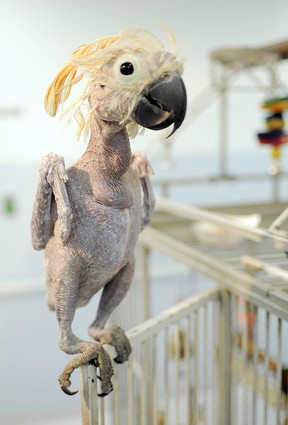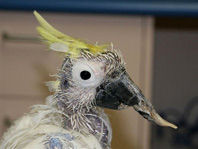
PBFD stands for Psittacine Beak and Feather Disease. It is caused by a virus that only occurs in parrots. There is no cure for PBFD so it is important to prevent your cockatoo from getting it.
PBFD is originally from Australia, where it still commonly occurs in wild parrots and cockatoos. Because of world travel, the disease isn’t limited to Australia any more.
Symptoms of PBFD
The most clear and common symptom of PBFD is the loss of feathers. The cockatoo becomes bald and the feathers don’t grow back. This occurs usually first at the chest of the bird, but eventually all feathers will be affected. Another symptom is malformation of the beak, the beak becomes long and looks quite brittle. Sometimes small wounds occur around the beak.
In later stages of the disease the cockatoo will loose a lot of weight and its immune function will be compromised. This can cause the bird to be susseptible to simple infections, even fungal infections, and can cause the death of the bird. Young cockatoos will often die of PBFD, while older birds can still recover completely.
 The time between getting infected and showing symptoms of PBFD (the incubation time) is 2 to 3 weeks. Sometimes a cockatoo does not show any symptoms after infection. It will become a carrier of the virus. It has the virus in its body, but does not get sick. A carrier can infect other birds. When the immune system of a carrier gets compromised for some reason, PBFD can surface and cause symptoms.
The time between getting infected and showing symptoms of PBFD (the incubation time) is 2 to 3 weeks. Sometimes a cockatoo does not show any symptoms after infection. It will become a carrier of the virus. It has the virus in its body, but does not get sick. A carrier can infect other birds. When the immune system of a carrier gets compromised for some reason, PBFD can surface and cause symptoms.
Ways of infection with PBFD
A cockatoo or parrot can get infected with PBFD by a bird that already has the disease. Contact with feces, feather dust, dandruff, food from the gizzard and fluid from nose and eyes can transfer the virus. The virus will stay virulent for a long time, so also dried out feces can be a source of infection.
People cannot get PBFD, but can transfer the virus by transferring dust, feathers or feces of infected parrots.
Testing for PBFD in cockatoos
A simple blood test is enough to detect Psittacine Beak and Feather Disease in a cockatoo or other parrot. This test will detect also cockatoos that are carriers of the virus.
Many sellers will offer you test results of the cockatoo you are wanting to buy on chlamydia (psittacosis), PBFD and Polyoma. I advise you to ask for these tests before buying a cockatoo.
